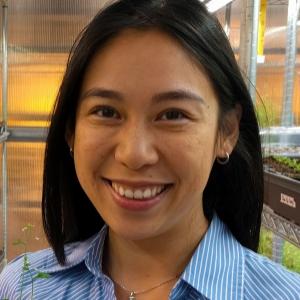
Lily Cheung
Assistant Professor
Lily Cheung got her research start as a sophomore at Rutgers University, where she graduated Summa Cum Laude with a B.S. in Chemical Engineering in 2008. She then earned her Ph.D. in Chemical Engineering from Princeton University in 2013. Under the supervision of Stanislav Shvartsman, she characterized gene regulatory networks controlling the development of the model organism Drosophila melanogaster, using a combination of molecular biology, genetics, and reaction-diffusion modeling.
During her postdoctoral training with Wolf Frommer at the Carnegie Institution for Science, she designed biomolecular sensors to quantify sugar transport in plants. Her current interests include the use of high-throughput quantitative techniques and mathematical modeling to advance our understanding of how metabolic and gene regulatory networks interact to control plant growth.
Lily is the recipient of a NSF NPGI Postdoctoral Fellowship in Biology, a NSF CAREER Award, and a Human Frontier Science Program Early Career Award.
404-894-2826
Office Location:
ES&T L1230
Georgia Institute of Technology
Engineering of genetically encoded biosensors Quantitative fluorescence microscopy and image analysis Computational models of gene regulatory networks Transcriptional regulation and developmental biology of plants The past fifteen years has seen dramatic advancements in genome sequencing and editing. The cost of sequencing a genome has decreased by two orders of magnitude, giving rise to new systems-level approaches to biology research that aim to understand life as an emerging property of all the molecular interactions in an organism. At the same time, technologies that allow site-specific modifications of the genome are enabling researchers to manipulate multicellular organisms in unprecedented ways. From reductionist approaches to systems biology, and from conventional plant breeding to synthetic biology, the future of plant biology research relies on the adoption of computational methods to analyze experimental data and develop predictive models. In biomedicine, mathematical models are already revolutionizing drug discovery; in agriculture, they have the potential to generate more efficient, faster growing crop varieties. The goal of the Cheung lab is to bring quantitative techniques and mathematical modeling to plants in order to gain systems-level insight into their physiology and development - particularly to understanding how metabolic and gene regulatory networks interact to control homeostasis and growth.
IRI Connection:




